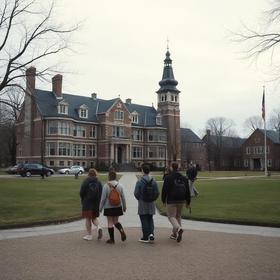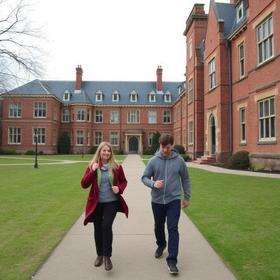Read more details about Fork Union Military Academy on their 2026 profile page.
Reflections and Advice:
1.) What do you think makes your school unique relative to other boarding schools?
In 1961-1964 Fork Union Was a very focused military preparatory school with emphasis on scholastic and athletic skills. I went there because of the one subject plan and they got me through my high school years with way better grades than I had been getting in middle school. With 6 subjects I was overwhelmed with homework and subject separation problems. With the one subject plan I was able to concentrate on the subject of the moment with total focus and for me that was the perfect fit.
Most importantly The curriculum at FUMA taught Bible studies and table manners; which fork to use, don't eat out of the finger bowl, how to set a table, how to serve a seated guest etc...
They taught respect for yourself, and for others. They taught honor and honesty, and so many other things we need to be successful, responsible christian adults.
I feel that my years at FUMA would be comparable to high school and two years of college with life experience thrown in in today's world.
I did not go, or want to go to college so for me FUMA prepared me for life.
I joined the Navy out of FUMA and then followed that experience with a 35 year career as a tugboat/ supply boat/ dive support vessel captain.
So I reversed the process and got the experience at sea first, then went to school to learn the academics of the trade
2.) What was the best thing that happened to you in boarding school?
The best thing I liked about FUMA was hearing the announcement of the winner of the weeks company competition. Getting ready for Sunday parades, and the day school was over for the year.
Did I mention I didn't like school.
When I graduated from Fork Union I knew I was capable of doing anything I wanted to. I had the background and I knew how to take care of myself. I just didn't yet know what to do with my new-found knowledge.
3.) What might you have done differently during your boarding school experience?
Looking back I could have done a better job of learning more about the big picture. Learning about how the system worked and how to use that knowledge to become more engaged in the whole system instead of just my single place in the system.
My advise would be to get involved in the operation as much as you are allowed.
Listen, learn and think about what is happening, what seems to work and where the system could improve. Then quietly inject those ideas into the conversations so it seems like the ones in power had the idea.
4.) What did you like most about your school?
They instilled in me a pride in my school, a pride in my company, a pride in myself, and a pride in the military, and a pride in my country, that never dulled.
5.) Do you have any final words of wisdom for visiting or incoming students to your school?
The most important advise I could offer is:
1. Don't give up. You will get used to this.
2. Hold your temper. Count to 10 before saying something that will cost you a lot of time and trouble.
3. Pay attention when a upper class man is speaking to you. Because the second time he tells you he will not be nearly so nice.
4.Commit to work hard at whatever the task you are given to achieve a successful outcome.
5. Do it the way you are told to do it.
Academics:
1.) Describe the academics at your school - what did you like most about it?
As Stated I liked the one subject plan. I also liked the required study time CQ) With hall monitors that could help answer questions during the study period.
I also liked the Bible studies and the MST (military science training).
I liked the School in the morning and free time in the afternoon schedule.
Monday afternoon was Drill training. Tuesday and Thursday was military science training. Wednesday was manners training and Bible study. Friday was getting ready for Saturday inspection of room, rifle, personal.
Did I say free time in the afternoon??
We didn't have "professors". We had Captains, Majors, and Colonels as instructors.
Company Competition was fierce and constant. From winning inspections, and winning sporting events, and winning scholastic scores, and winning with less demerits than other companies, to winning drill competitions, we were always "on our toes".
Athletics:
1.) Describe the athletics at your school - what did you like most about it?
I didn't participate in sports except the intramural sports. I wasn't good enough and didn't have the drive to be a star athlete.But FUMA always had a winning football team, and track and swimming teams did well also.
The coaches were considered the best.
Art, Music, and Theatre:
1.) Describe the arts program at your school - what did you like most about it?
We had Band and glee club.
I think the closest thing to a drama class was public speaking class. which I took and enjoyed.
Extracurricular Opportunities:
1.) Describe the extracurriculars offered at your school - what did you like most about it?
We had Glee club rifle team, drill team, debate club, Spanish club and French club.
The drill team was a very elite platoon who drilled every day and were considered the best drill team of the surrounding schools.
Dorm Life:
1.) Describe the dorm life in your school - what did you like most about it?
Dorm life was noisy and active.
Somebody was always going up or down the wooden stairs in the section and we always had to wax and buff the hall floors. 2 men to a room in the section (Old original section). 3 men to a room in the annex (new, added on section)
There was no late night food access. after CQ, you had 10 minutes to taps and you were not allowed out of the barracks.
Room selection process???
We were led to our room and told which bunk was ours. That was all the selection we had unless we got in a fight with our roommate, then you got a new roommate.
Same with barracks selection. you were assigned.
Dining:
1.) Describe the dining arrangements at your school.
The dining hall was under the first floor of the administration building.
We were seated 6 to a table and were served by student waiters who were paying part of their tuition by waiting tables in the dining hall.
The food was really good. We had a chef who used to be the head chef of the White House.
Dining room hours were
breakfast: 6:30 AM to 7:30 AM.
Lunch: 1:PM to 2:PM
Supper: 5:30 PM to 6:30 PM.
The Sabre Shop was our snack bar, social hall. open from 2:PM to 5:30 PM Saturday open till taps.
Social and Town Life:
1.) Describe the school's town and surrounding area.
No town. No town life.
2.) Describe the social life at your school - what did you like most about it?
Social life centered around the military model. We were all boys trying to survive this new life style.
Our conversations were about polishing shoes, girls, ironing uniforms, girls, buffing hall floors, girls, algebra, girls, home leave, girls.
Read more details about Fork Union Military Academy on their 2026 profile page.
Alumni Reviews Review School
Review
Description
One of the most famous aspects to our school is it's one subject plan. The one subject plan is an idea where every student attends a single class every week day for 7 weeks, throughout. . .
Fork Union will change your son’s life. I’m not exaggerating. I’m not using hyperbole. I have no vested interest in convincing you of this fact. FUMA is a special place, and it will take the. . .
Fork Union's One Subject plan was instrumental in regaining my place among my peers when it came to class standing. The ability to completely focus on one subject for a 8 week semester was absolutely. . .
Show more reviews (4 reviews)
Recent Articles

What Boarding School Is Like in 2026: Life, Costs, Trends
Learn what boarding school life is like in 2026, including costs, routines, policies, trends, and planning tips for parents and students.

Famous Boarding School Alumni and What They Teach Parents (2026 Update)
Updated 2026 guide to notable boarding school alumni, trends in costs and enrollment, and what families should know when planning for boarding school.

How to Visit a Boarding School Campus: Parent Checklist
A step-by-step 2026 parent checklist for visiting a boarding school campus, from planning to post-visit evaluation.





